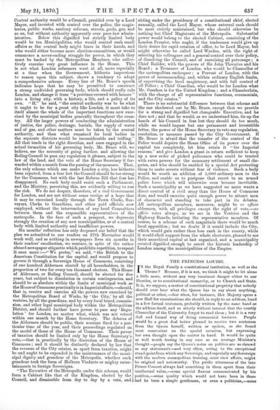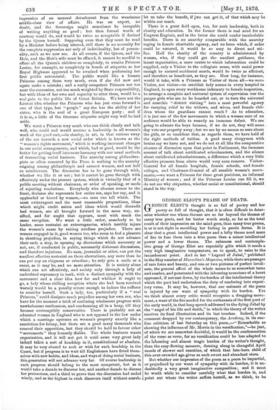THE PRINCESS LOUISE.
I S the Royal Family a constitutional institution, as well as the Throne? Because, if it is not, we think it might be let alone a little more, without any very imminent danger either to our liberties, or to constitutional monarchy, or to Church and State. It is, we suppose, a matter of constitutional propriety that nobody should ever hear what the Queen has to say about anything, political or other,—that when, for instance, Her Majesty opens a new Hall for examinations she should, in reply to an address, hand in a few formal sentences, probably written by the same hand as the address itself, and so utterly without interest that the courtly Chancellor of the University forgot to read them ; but it is a very dull and formal way of doing ceremonial business. People would be a great deal better pleased to receive two sentences from the Queen herself, written or spoken, as she found most convenient on the special occasion, but expressing her own thought upon the matter in hand. It would be quite as well worth having in any case as an average Minister's thought —people say the Queen's notes on politics are as shrewd as any statesman's—and very often, owing to the exceptional stand-pointfrom which any Sovereign, and especially any-Sovereign with the modern cosmopolitan training, must view affairs, might be original and noteworthy. The public utterances of the late Prince Consort always had something in them apart from their intellectual value,—some special flavour communicated by his position,—some quality which would not have been in them had he been a simple gentleman, or even a politician,—some
impression of an unusual detachment from the wearisome middle-class view of affairs. He was an expert, no doubt, and the Sovereign might sometimes be incapable of writing anything so good ; but then formal words of courtesy would do, and would be twice as acceptable if devised by the Queen herself. Supposing even that they must be read by a Minister before being uttered, still there is no necessity for the complete suppression not only of individuality, but of person- ality, such as we now see. At all events, if the Queen, and the Heir, and the Heir's wife must be effaced, it cannot be needful to efface all the Queen's children so completely, to swathe Princess Louise, for example, so completely in bonds of etiquette as her Royal Highness appeared to be swathed when performing her first public ceremonial. The public would like a human Princess among them very much, even if she did now and again make a mistake ; and a really competent Princess not too near the succession, not too much weighted by State responsibility, but with ideas of her own and capacity to utter them, would be a real gain to the public life of Great Britain. We have not the faintest idea whether the Princess who has just come forward is one of that type, but " people " say she has the ability of her sister, who is the soul of a great European party ; and if it is so, a little of the tiresome etiquette might very well be laid aside.
We want a Princess very much who can think clearly and talk well, who could and would assume a leadership in all women's work of the good sort,—in charity, in art, in that curious sway of the sex towards a new social order which is known as the "woman's rights movement," which is working incessant changes in our social arrangements, and which, bad or good, would be the better for getting itself into more harmony with our usual methods of transacting social business. The anarchy among philanthro- pists so often censured by the Press is nothing to the anarchy reigning among philanthropic and earnest women, and not half so mischievous. The discussion has to be gone through with, whether we like it or not ; but it cannot be gone through with effectively under the present system, which is virtually that of a public meeting without chairman, or order of speaking, or mode of rejecting resolutions. Everybody who chooses comes to the front, declares she represents her entire sex, says her say, and is applauded or hissed by women,—no man can tell which. The most extravagant and the most reasonable propositions, ideas which might credit saints and ideas which would discredit bad women, are all brought forward in the same way, un- sifted, and for aught that appears, meet with much the same reception. We want a little order, somebody to be leader, some restraint on extravagancies, which terribly injure the women's cause by raising needless prejudice. There are women engaged in it, good women too, who seem to feel a pleasure in shocking prejudice, in saying things which do not advance their ends a step, in opening up discussions which necessary or not, are, if conducted in public, necessarily dishonest discussions, and therefore injurious. No man, journalist or other, can put the smallest effective restraint on these aberrations, any more than he can put any on chignons or crinoline ; he only gets a smile or a sneer, as it may be, and no more attention. It is society alone which can act effectively, and society only through a lady of undoubted supremacy in rank, with a distinct sympathy with the movement and a clear idea how far and whither it ought to go, a lady whose chilling reception where she had been received warmly would be a penalty severe enough to induce the sufferer to consider herself. Such a lady, too, particularly if a " real Princess," could dissipate much prejudice among her own sex, who have for the moment a trick of confusing wholesome progress with unwholesome restlessness, and condemning all in a heap, till they become contemptibly conservative. There is probably not an educated woman in England who is not opposed to the law under which a marriage operates on woman's property exactly like a conviction for felony, but there are a good many thousands who conceal their opposition, lest they should be held to favour other " movements " they honestly dislike. The whole business wants organization, and it will not get it until some very great lady indeed takes a sort of headship in it, constitutional or absolute. It may be very absurd to seek or wish for such -headship in the Court, but if progress is to wait till Englishmen have fitted them- selves with new habits, and ideas, and ways of doing social business, this generation will not advance very far. Of course leadership in such progress should belong to the most competent, but as it would take a decade to discover her, and another decade to discuss her pretensions, and a third to prove that the discussion had ended wisely, and as the highest in rank discovers itself without search,
let us take the benefit, if pre can get it, of that which may be within our reach.
There is a great field open, too, for such leadership, both in charity and education. In the former there is real need for an Empress Eugenie, and in the latter she could confer incalculable benefits. There is no anarchy comparable with the anarchy raging in female charitable agency, and no force which, if order could be restored, it would be so easy to direct and uti- lize. Half the charity of the country is administered by women, who, if they could get the smallest guidance, the laxest organization, a mere centre to which information could be supplied, only a Visitor in the collegiate sense, with social power enough to unravel accidental snarls, would be twice as efficient, and therefore as beneficent, as they are. How long, for instance, would it take, with a Princess as Visitor of them all—we mean Visitor, not visitor—to establish lady nurses in every hospital in England, to open every workhouse infirmary to female iuspection, to arrange a complete and universal system of supervision. wer the pauper girls who are to be boarded out, or to turn the universal and anarchic "district visiting" into a most powerful agency for carrying relief to the widows, and wives, and female chil- dren whom the guardians cannot reach ? As to education, it is just one of the few movements in which a woman sure of an audience would be able to remedy an immense defect. We are going to educate the boys because, if we do not, they will some . day vote our property away ; but we are by no means so sure about the girls, or so confident that, as regards them, we have hold of the right methods of tuition. A good many clergymen with brains say we have not, and we do not at all like the comparative absence of discussion upon that point in Parliament, the immense amount of talk about certificated schoolmasters, and the silence about certificated schoolmistresses, a difference which a very little effective pressure from above would very soon remove. Visitor- General for all female hospitals, female schools, and female colleges, and Chairman-General of all sensible women's move- ments,—we want a Princess for those great positions, an informal Ministry of women ; and if the Princess Louise can fill it, we do not see why etiquettes, whether social or constitutional, should stand in the way.































 Previous page
Previous page